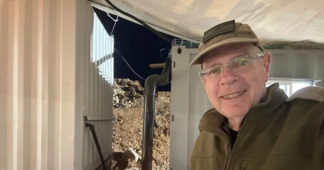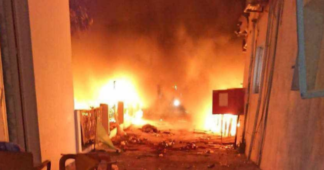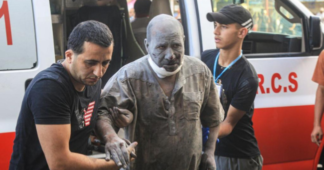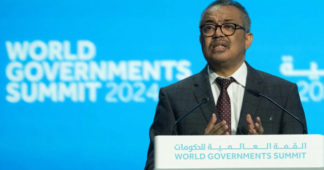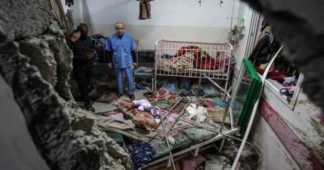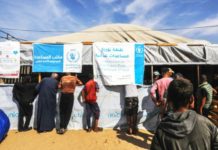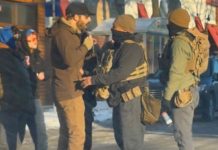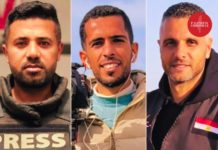Christos Georgalas is a volunteer doctor in Gaza
Interview by Costas Zafiropoulos, 25 May 2025.
Published at www.efsyn.gr
Translated from Greek by Christian Haccuria
Christos Georgalas is a highly accomplished head and neck surgeon and professor at the University of Nicosia. He also works as a doctor at a major private hospital in Athens. He is one of the few Greek doctors to have volunteered in Gaza in recent months. From 21 April to 21 May 2025, he was at Nasser Hospital in Khan Younis in southern Gaza as part of a mission by the British organisation Medical Aid for Palestinians, alongside a vascular surgeon and a plastic surgeon.
This was his second time travelling to Gaza — the first was during a two-month mission with the Red Crescent in 2012. During his time there, the hospital was struck twice by Israeli attacks.
‘I can’t say that I went to war. War is a very different thing. There was no war in Treblinka or Auschwitz. War involves two armies. Here, you have a population largely made up of civilians, women and children with no means of escape. And bombs rained down from the sky systematically. They hit hospitals; they hit journalists. The conditions my colleagues faced there were tragic. But there’s also an optimistic side: we even held classes! There were exams for the residents. While I was there, we conducted multiple-choice exams for the resident trainees so they could progress towards their degrees and specialisation,’ he begins to recount.
How did you decide to go? I mean, doesn’t it seem like being there means you’re in immediate danger?
I think only a fool wouldn’t consider it. So far, 1,400 healthcare workers have been killed. You do think about it, but you also think that this is the most significant event of our generation. The first genocide we’re witnessing live, in real-time. I think it’s even harder to decide that this doesn’t concern you. Or that it does, but from a distance. I don’t know—maybe it’s also because I’m a doctor. Medicine is about seeing people who need you. I felt it was my duty. It’s also a way to let the people of Palestine know that most people are not on board with what their governments are doing. I thought, if I can’t change my own government’s policy in Greece, I can at least show through action that I disagree with it.
One thing I didn’t expect was how closely they follow what’s happening in the West—the protests for Palestine, which countries they’re happening in, who’s participating, how large they are. They have a very clear view of what’s going on.
You got back just a few hours ago. What’s your mindset right now?
Two things. The first—which might sound strange—is that I came back more optimistic than before I left. What no one expects is that, in practice, Palestinians are not just victims. They are an incredibly active, vibrant, resilient, educated society. If the goal was to dismantle their social fabric, they haven’t succeeded. In many ways, it’s stronger than what we have in Greece right now.
The second is my sense that this is primarily a war against children. It can’t be explained away with the usual argument that “Gaza has a high percentage of children, so statistically, more children will be victims.” I believe it largely has to do with a deliberate attack. An Israeli MP even said, “Children are their future, so it’s doubly important to target them compared to adults.” Still, I never thought I’d see this policy implemented as starkly as I have.
Palestinians are not just victims—they are an incredibly active, vibrant, resilient, educated society. If the goal was to dismantle their social fabric, they haven’t succeeded.
Most of the patients I treated were kids, not grown-ups. We’re talking about ages 9, 8, 11, 6… The children I saw had neck injuries. Tiny wounds, just millimeters wide from shrapnel, but with extremely high entry velocity. You’d see a small hole in their neck, but the CT scan showed their larynx, trachea, and spine destroyed. These are small projectiles. Recently, there was an arms exhibition in Greece. These children could ‘demonstrate’ just how… effective these bombs are—when they explode, they scatter countless tiny fragments over a vast area, piercing anything in their path. These fragments literally shred children. And then there are the dead children we saw in the morgue…
Every day, 200 to 300 wounded arrived at the hospital. Roughly, the ratio of dead to wounded is about 1 to 3.
What is the current state of Nasser Hospital?
It was hit twice during my time there. One of our concerns before going with my team was that it had already been struck in March. When they supposedly targeted a Hamas leader, the surgical floor was hit.
The first three weeks passed without the hospital being targeted. Then, in the last week before I left, it was hit twice. The first was on Wednesday [May 14]. We were sleeping inside—we stayed in the hospital all day for safety. We couldn’t leave at all. Barely even step into the courtyard.
We were on the fourth floor, where the operating rooms, ICU, and foreign doctors’ dormitories were. The third floor, right below us, was hit. At 3:30 AM, the burn unit. The target was a journalist. The journalist was killed, the bed next to him was hit, and the nurses were wounded. Five days later, the courtyard and the hospital pharmacy were struck. The first strike was with two drones, the second with a missile.
The hospital where I worked had been occupied by the Israelis for two months—February and March 2024. The doctors who remained were tortured. They were lined up one by one and beaten. Around 80 were abducted in total. Of those, 40 are still missing—we don’t know where they are or if they’re alive. Many were killed on the spot.
The Nasser Hospital’s Artificial Kidney Unit, which was completely destroyed by the Israeli army in March 2024 as the hospital was under military occupation for two months. When the Israelis fled to the surrounding area (which can also be seen in the photo), mass graves were discovered there with 180-200 corpses inside.
Were you able to go out into the city? What did you see?
Yes, I went out even though we weren’t supposed to. After three weeks, I couldn’t take it anymore. The destruction was terrifying. There were streets where buildings had been systematically leveled. And as my “guide”—my colleague—told me, all of them had people inside. Four-story buildings collapsed slab by slab. That’s when you realize how many lived there.
My colleague’s sister—a resident—was killed in the second month of bombing, along with her son, while she was eight months pregnant with her second child. Most of my colleagues had lost family members, if not immediate family, then other relatives. And not a single one hadn’t been forced to evacuate their home, not just once, but many times. One senior doctor had evacuated ten times.
Where did they stay afterward?
Some stayed in tents. One colleague, Ahmed, had been living in a tent for the last five months. Another had moved ten times between relatives’ and friends’ homes. Homes in Gaza don’t function individually—there’s always someone who can take you in. The logic isn’t, “My house wasn’t hit, so my family stays as usual.” They fill the rooms with cousins, friends, relatives who’ve lost their homes.
Before the “war,” Gaza had no homeless. Unlike our cities, Gaza had no homelessness. There’s a culture, a mindset—this is why I keep mentioning solidarity—a culture that doesn’t allow someone to sleep indoors while another sleeps on the street.
People know they’re targets at any moment. The rate of bombing was truly horrifying. After a while, you got used to it, but there were never more than five to ten minutes without an explosion. Gaza is small. 500-600 bombs fell daily. Even divided into four sectors, that’s at least 100 explosions per sector per day.
How is the situation now with the total blockade?
Everything has gotten much worse. This is the worst period of the entire genocide. We were relatively “privileged”—as Westerners and doctors—we had guaranteed food. Rice, for a month. Our meals were rice. Exclusively. Nothing else. Sometimes beans were mixed in. No vegetables. No protein—no fish, no fruit, certainly no meat.
Let me put it simply: my colleagues had lost 26 kilos since the genocide began. I lost about 8 kilos in one month.
How did your colleagues describe the preceding months?
A Spanish colleague told me that when the Israelis entered the hospital with the MRI machine, they tried to destroy everything. But an MRI is a massive machine—like a car. Even if you shoot it, it can be repaired. So, they brought a specialist engineer to permanently disable it. Because even if a bomb went off next to it, it might still be fixable. They needed someone who knew the machine’s heart to render it unusable. And that’s exactly what happened last February.
In our hospital, the Israelis went through the incubators in the neonatal unit and systematically smashed them one by one. The incubators—with the butt of a gun! My colleagues documented this.
If you look into why certain doctors were targeted over others, there’s a logic to it. It wasn’t random. Usually, they were the best in their field. For example, there was a doctor who performed cochlear implants. He was a target from the start. Precisely because he could rebuild—he was key to restoring care. Similarly, at universities, those targeted first were those with the most academic contributions. The logic is, “We want to erase Gaza’s future”—those who could rebuild it. Academically, clinically, even artistically.
What is the morale of the people?
I’ll tell you about my team, the doctors. There was Yasser, who suffered from depression. Many others faced things with incredible strength. You know what? They have very strong support systems. And their relationship with religion is very healthy. It truly helps them, but in a way that doesn’t exclude others. I never felt like a non-Muslim there. Religion functions as a form of solidarity, support, patience—nothing aggressive.
Above all, though, there’s exhaustion. Deep down, everyone thinks they want to exterminate them. To drive them out of Gaza. They watch Al Jazeera news all day. And there, the news is your life—it’s not theoretical. It’s their future.
They told me, “This time, if they order evacuations again, we won’t leave. We’ll stay here. We’re tired. If we leave, we’ll never find our homes again. We’d rather all die together in our homes than die on the streets.” And they said it with calm determination—no heroism, just resolve.
We remind our readers that publication of articles on our site does not mean that we agree with what is written. Our policy is to publish anything which we consider of interest, so as to assist our readers in forming their opinions. Sometimes we even publish articles with which we totally disagree, since we believe it is important for our readers to be informed on as wide a spectrum of views as possible.
